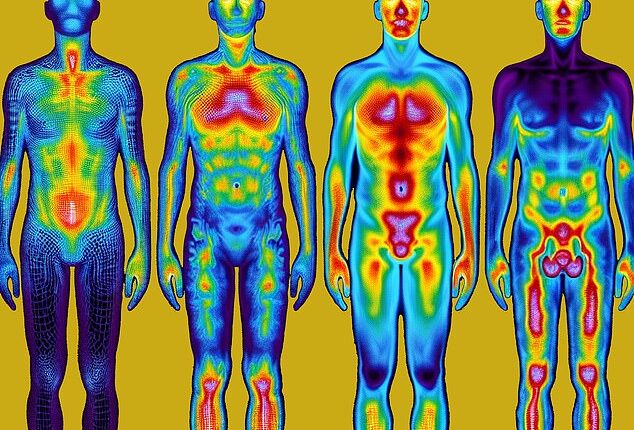Getting out on a long walk or taking part in outdoor activities without having to wrap up warm against the elements is one of summer’s great pleasures.
But with rising temperatures predicted for later this month and the holiday season on the horizon, it’s a good time for us all to remember the very real dangers of heatstroke.
Far from being simply a matter of feeling hot, it’s a massively underestimated condition that can quickly cause irreversible damage to our organs and kill.
Last year’s heatwave in Europe, for example — which saw temperatures exceed 48c — is estimated to have caused 60,000 deaths.

Heatstroke is an underestimated condition that can quickly cause irreversible damage to our organs and kill
And, of course, the issue was brought to the fore recently following the tragic death of my esteemed colleague, Dr Michael Mosley, who was found collapsed on the Greek Island of Symi — and although the exact cause is unknown, the baking heat seems to have played a role.
And temperatures don’t have to be particularly high to pose a health risk — the risks increase as the temperatures rise above 25c, especially if it is humid as well as hot (more on this later). These risks start to go up within minutes of being exposed to high temperatures.
Some groups are particularly vulnerable, such as the elderly and people who are obese or who have an infection – as these states hinder your body’s ability to regulate its temperature.
But the main risk factor is if you are not used to the heat. For instance, if you suddenly go from dark, damp England to two weeks in a sun-filled paradise, you are much more at risk than the locals who have adapted to that weather.
But as someone who has treated cases of life-threatening heatstroke, I can tell you that there are ways to prevent it.
First, it’s useful to understand how heat can wreak such rapid and devastating havoc on the human body.
Our bodies are designed to function at around 37c; the enzymes and proteins so crucial for processes such as sending nerve signals around the body start to break down as temperatures get hotter than this.

The baking heat is thought to have played a role in the death of Mail columnist Dr Michael Mosley, who collapsed on the Greek Island of Symi last month
This can have dire consequences as cells die, toxic compounds are released and organs literally start to shut down.
To avoid this, our bodies have very sophisticated mechanisms for sensing and regulating body temperature as close as possible to 37c. This is why we sweat when it’s hot outside, for example, as the sweat evaporating off the skin has a cooling effect on the body.
But in some conditions, these mechanisms set up to regulate our body temperature aren’t as effective.
For instance, in hot and humid conditions the air is already full of moisture, which stops the sweat from evaporating efficiently. And when sweat can’t evaporate it can’t cool the body, causing a dangerous rise in body temperature.
Vigorous exercise also creates its own body heat, so much so that the body can’t sweat enough to cool itself down. If the exercise is prolonged and intense, such as marathon running, you can get heatstroke in normal temperatures.
Often the first sign of heatstroke is confusion, as brain cells are the most sensitive to changes in temperature.
Other symptoms of heatstroke include dizziness; nausea; throbbing headache; hot, red and dry or damp skin; rapid pulse and fainting. These are all red flags to watch for.
As cell damage progresses, all our organs can slowly shut down within minutes. But with effective treatment, this can be halted in its tracks and reversed.
The heat damage happens via a number of mechanisms — and we’re slowly uncovering this science in order to help us develop better treatments.

Often the first sign of heatstroke is confusion, as brain cells are the most sensitive to changes in temperature
First, more blood is directed to the skin to help with sweating, so there is reduced blood flow to the key organs — which can lead to organ failure.
Proteins in muscles start to break down and get released into the blood, which damage the kidneys.
Lack of fluid also contributes; it’s possible to sweat as much as 1.5 litres of fluid in an hour, causing dehydration and a reduction in blood volume, making it harder to maintain proper blood pressure.
All of which means that the heart needs to pump faster and harder to send the blood to the skin — and we know this can put strain on the heart. This was illustrated by a study in the journal Annals of Internal Medicine last month.
Researchers in Canada examined 60 adults and found that for every 1.5c increase in body temperature, blood flow to the heart doubled in younger and healthier patients.
But in those with heart disease, not only was there less of an increase in blood flow but they also started to suffer from ischaemic damage to the heart, which is a precursor to a heart attack.
Meanwhile, research in the European Journal of Applied Physiology last year showed us that gut damage occurred as body temperatures rose — and that older people suffered more damage than younger people.
It’s thought that this group is particularly susceptible to gut damage, which in turn allows bacteria to leak into the bloodstream, potentially causing sepsis, a life-threatening reaction to infection.
Studies such as this have led many of us in emergency medicine to start to give intravenous antibiotics to those who are profoundly unwell from heatstroke.
Indeed as an A&E consultant I have tragically seen patients die because effective treatment was not prompt enough.
Others have suffered from significant harm, needing to spend weeks in hospital; while many who do make a good physical recovery often have impaired cognitive functions months after their heat injury.
And when it comes to effective treatments, the UK is leading the way thanks to research by military doctors studying the effects of heat on armed forces personnel and marathon runners — who despite being fit are at risk of developing heatstroke due to the effects of extreme exertion in hot temperatures.
One life-saving innovation, originally developed for the Royal Marines, is a portable ‘iced water body bag’.
Designed by Dr Ross Hemingway of the Marine’s Commando Training Centre, this is used to wrap around the body of a person suffering from heatstroke, to immerse them in ice-cold water. It can be so effective that they need no further treatment.

Holidaymakers should consider soaking their hats in cold water before setting off on a day out
This is because we now understand just how critical it is to cool the body as soon as possible before the heat damage occurs.
It’s been successfully used to treat 75 members of the armed forces with heatstroke — a number of whom would undoubtedly have otherwise died.
I witnessed its effectiveness myself last year when, for the first time, it was instrumental in saving the life of a civilian — a competitor at the Brighton Marathon, where I was medical director.
Even if you’re not running a marathon or exercising like a Royal Marine, there are lessons we can all learn to protect ourselves from heatstroke.
These are applicable at home and abroad, where it can be easy to underestimate the threat of extreme temperatures.
First, if you are planning a holiday in hot conditions, getting acclimatised to the heat is crucial — so spending time in a sauna prior to a holiday can be an incredibly effective preventative strategy.
And when you do visit, stay out of the sun as temperatures reach 30c, say, and venture out in the evenings instead when it’s likely to be cooler.
As well as sunscreen and a hat, wear light-coloured clothing made from cooling fabrics (cotton is best) — these allow heat radiation and sweating.
Heatstroke goes hand in hand with dehydration so we need to drink much more than normal. Make sure you are never thirsty, your urine is pale and clear — and avoid coffee and alcohol as both are diuretics.
Do more to keep cool: Tour de France cyclists wear ice jackets before they start riding — you could copy this at least by soaking your hat in cold water before you set out.

Heatstroke goes hand in hand with dehydration — so make sure you never feel thirsty
Where possible, you should also avoid anti-inflammatory drugs such as Voltarol and ibuprofen. As I’ve previously warned in these pages, they can impair kidney function and damage the gut, making you more likely to suffer from heatstroke.
If you do feel you are becoming unwell or notice anyone getting confused in the heat, simple first aid helps: move out of the sun, drink cold water and cool down.
If you feel no better, take a cold shower — you should feel better within five to ten minutes. If that’s not practical, put damp towels over yourself.
If you get worse, then the treatment is immersion in cold water and you will need help for that — get that help as soon as possible.
DO THIS…
Take up gardening — it can reduce the risk of depression, according to research from Anglia Ruskin University.
In a review of studies looking at physical activity as a mental health intervention it found the strongest benefit came from low and moderate activities such as gardening, golf and walking, rather than high-intensity workouts.
‘Moderate exercise improves mental health via biochemical reactions, whereas high-intensity exercise may worsen stress-related responses in some individuals,’ researchers said.









